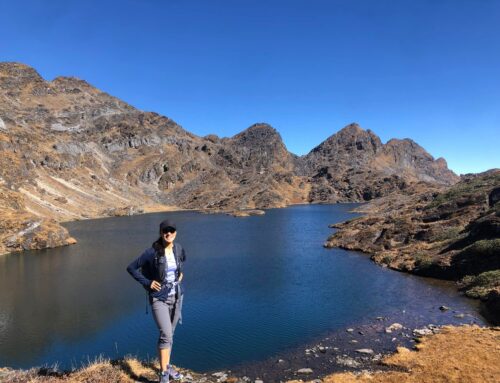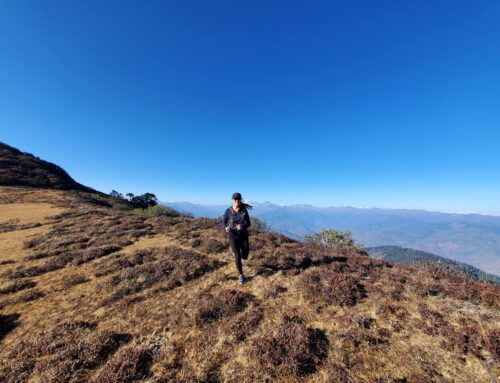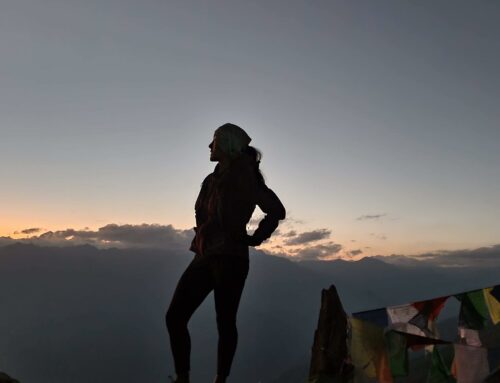Day 15 - you want to read this story from the beginning. Please start here!
So I was in Guwahati, in the midst of a curfew and an invisible threat - it was one o'clock at noon. I only knew that there had been violent riots the day before. From my travels to Bhutan, I had a very diffuse image of rebels who have been marauding in the jungle on the border between Bhutan and Assam for more than 20 years with arbitrary violence and anarchic sentiments. At the time, I didn't know that the initiators of the current demonstrations were students and intellectuals.
I was a tall, conspicuous tourist - fortunately I hid my hair under a headband. Hair colors other than black, combined with my height, always cause a sensation everywhere in India. During a visit to the Tadj Mahal in Agra in 2018, my hair and my colleague's red hair were the most popular photo opportunities for Indian pilgrims.
In any case, that midday in front of the Guwahati airport I caught the attention of the military policemen - and immediately afterwards the taxi drivers. Whenever I was in an Indian city, there were always trusted friends or a concierge at my hotel who would take care of my driver in a reasonably safe vehicle. Travel guides and even the Indians warn strongly against negotiating as tourists with the men (none of those with a serious taxi license) in front of the arrival halls. But this time the driver who was booked for Tshering and me wasn't within reach - everything was different, I was left to myself. I didn't have a phone connection, so I hadn't spoken to Tshering yet. Before my departure he had only advised me to check in at a hotel near by the airport, if possible.
The police officers were friendly, but I also noticed their nervousness - because I was the only western tourist around that day… They asked me if they could help me - the hotel booking desk was currently closed and the internet would not function. I asked them which of the two international hotels would be closer to the airport, the Radisson Blue or the NH hotel. During this time, the driver's crowd and voices grew louder and louder. I was standing in the middle of a group of screaming men, the only woman far and wide. The policemen weren't sure, but thought the Radisson would be recommended. The voices of the drivers got louder, no less threatening - they shouted prices at me. One of the policemen advised me not to accept more than 1500 rupees as the fare. And promptly there was a very young man - he should not have been older than 23 years, in a white coat, a bit cleaner and friendlier than the other men, and he offered exactly the recommended fare. The policeman nodded to me and said: Yes, go to the Radisson Hotel.
So we drove off. In the car I finally managed to establish a telephone connection to Tshering, who was still stuck in the border town of Samdrup Jongkhar and was not allowed to leave his country. I told him I was on my way to the Radisson Hotel - he just wanted to know how far it was from the airport. I had no idea and I couldn't really talk to the driver, he hardly spoke any English …
I hung up and the journey dragged on for an excruciatingly long time - and it was really spokie: I knew the streets of Guwahati very well from my previous visits. There are usually a large number of people everywhere - on foot, on rickshaws and bicycles or on small mopeds. And of course a lot of cars, buses and trucks. Guwahati is a vibrant city, an important economic hub on the border between Bhutan and Bangladesh. The crowd of people with mobile market stalls and food stalls in the streets there is usually just as bustling as you know it from Delhi or Mumbai. On this day, however: NO person, not even cows were on the streets and only very few cars. It was also quiet in the car, as no conversation between me and the driver was possible…. We were traveling on a four-lane motorway. The first roadblock made of burning car tires appeared in the opposite lane. Now the driver turned around to me, pointed to the roadblock, grinned all over his face - but it seemed to me to be more of a nervous laugh and he scolded something in his dialect ... but drove on. Shortly afterwards we slowed down and we stopped on the roadside ... Silence ... I couldn't see anything, for me the street was still deserted, I saw no further barriers, no noise - nothing. Behind us, other vehicles also came to a stop - and finally turned back. The driver just stared through the windshield - I had no idea what was happening. I had the only right inspiration, namely to call Tshering, because he speaks Hindi.
And my driver was sooo relieved when he was able to speak to Tshering, that could be clearly felt. Now I saw what had caused him to stop: about 200-300 meters away, demonstrators were standing on the roof of a ruined building on the side of the road and chanting with banners. Tshering gave him instructions to take me to a hotel where we had stayed the year before with a Swedish tour group. He tried to get in touch with reception by phone. It was actually the safest option, because the hotel was located in a large, paved parking area directly at the airport and was prepared for international guests. The taxi driver didn't know the hotel. Tshering gave him directions and wanted to get in touch when he got a confirmation from the hotel. They hung up and my driver turned. The relief only lasted for a short moment, because…. We were now driving in the opposite lane and only a few minutes later we found ourselves in front of the burning roadblock ... even if he could pass the car around, the driver preferred to stop - there was no other vehicle nearby - nobody was to be seen. He mumbled something, looked to the left into the streets of the adjoining residential area ... and then four scowling figures appeared and approached the vehicle ... I had already checked that the rear doors were locked at the beginning of the drive….
Read how the threat and my fear transformed into a warm feeling of charity and cultural integration on Day 16 of my Advent Blog …




